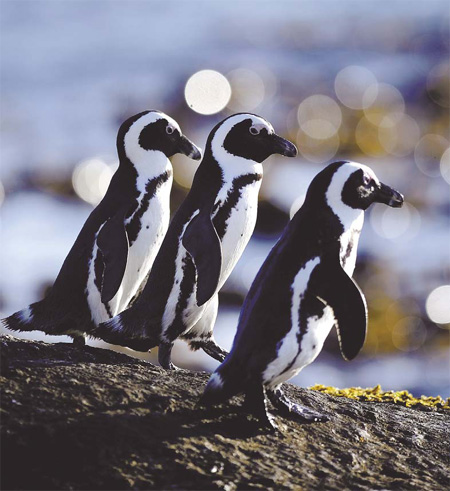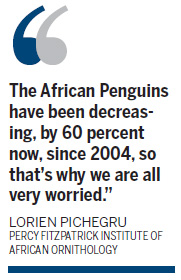Society
African penguin edging closer to extinction
Updated: 2011-04-12 07:08
(China Daily)
CAPE TOWN, South Africa - Penguins waddle over giant boulders and dive into the shallow turquoise sea to the delight of camera-ready tourists near the tip of South Africa.
The birds are a top attraction in Simon's Town, a naval village in Cape Town where motorists yield to the seabirds, but their numbers are dwindling, a worrying factor that also points to wider threats to the world's oceans.
 African Penguins are pictured on March 16 in Simon's Town near Cape Town, South Africa. Africa's only nesting penguin was reclassified as endangered last year. Scientists have estimated that only around 26,000 pairs remain, a significant decline since the beginning of the 20th century. Stephane De Sakutin / Agence France-Presse |
"The African Penguins have been decreasing, by 60 percent now, since 2004, so that's why we are all very worried," said Lorien Pichegru of the Percy FitzPatrick Institute of African Ornithology.
"There's 26,000 pairs left and that's the lowest number ever recorded. At the beginning of the 20th century we had more than 2 million birds."
Scientists call penguins an indicator species: one that is easy to monitor and can also point to unseen and wider problems in the ocean.
Africa's nesting penguins were reclassified as endangered last year after their numbers were nearly wiped out, likely as a result of competition for food from commercial fisheries and shifting fish stocks.

The flightless birds, known for their "tuxedo" plumage and their comical walks, mainly eat anchovies and sardines and only breed in southern Namibia and South Africa.
But changing fish patterns have forced them to travel farther to find food and even establish new nesting areas such as at Simons Town's Boulders Beach, where a pair arrived in the 1980s, and returning to Robben Island, famous for the prison that held Nelson Mandela.
"Food is one of the biggest threats, if not the biggest threat," said Rob Crawford of South Africa's department of environmental affairs, pointing to a 600-km shift in the migration path of sardines.
"Penguins cannot swim that far to feed their chicks and then at the end of breeding they've got to fatten up to moult as well," he said.
Birdlife International has warned that the African Penguin, one of the world's 18 penguin species, is edging closer to extinction.
To halt the slide, it has called for research into the effects of climate change and possible no-fishing zones around island colonies.
A 20-km trawling ban around the world's biggest colony on St Croix Island in Algoa Bay, east of Cape Town, allowed nearly three-quarters of birds there to stop having to make exhausting long-haul hunts, research showed last year.
Healthy populations of the seabird would ordinarily withstand raids by egg-stealing gulls and hunters like seals, cats, dogs or wild predators.
But the population concerns mean that every individual is now seen as critical, and oiled, injured and abandoned chicks are rescued. Last year 49 babies were flown off an Algoa island due to threats of cold weather.
Rehabilitation is successful "because the birds are so feisty and they are able to survive after the release (from captivity)", Southern African Foundation for the Conservation of Coastal Birds boss Venessa Strauss said.
The non-profit Cape Town-based organization treats around 1,000 penguins annually, including around 500 birds slicked in oil.
"It's bigger than the penguins. It's about the health of our marine ecosystem," said Strauss, surrounded by solemn rescued adults from the species once known as Jackass penguins because of their noisy brays.
"A lot of focus is on the penguins but at the end of the day it's about the ecosystem. The marine ecosystem is taking strain, and the penguins are just really telling a part of the story," she said.
Agence France-Presse
Specials

Share your China stories!
Foreign readers are invited to share your China stories.

Art auctions
China accounted for 33% of global fine art sales.

Waiting for drivers' seat
Lack of sponsorship appears to be why Chinese drivers have yet to race in a Formula 1 event